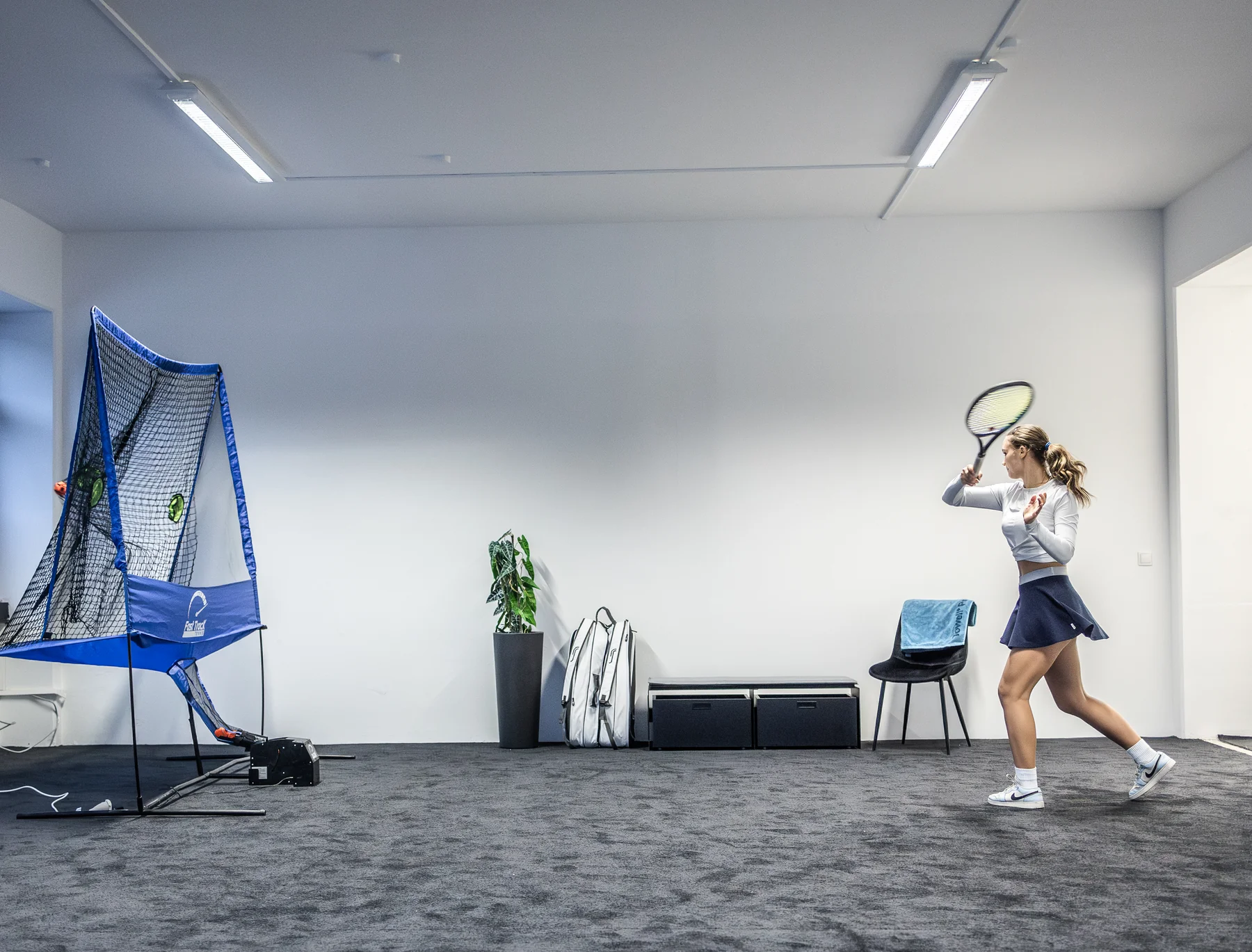Before a Division I tennis scholarship, a back injury, and a two-decade career on Wall Street, John Davey’s love for tennis was forged against a wall. Growing up in Detroit without the means for tennis lessons, Davey spent hours hitting tennis balls against the back wall of a bank parking lot, building the skills that earned him a scholarship to the University of Vermont. While a back condition ended his hopes of going pro, it didn’t diminish his passion for tennis, which later became the foundation of his entrepreneurial venture.
Davey, now a Hartford resident, has self-funded a startup called Fast Track Tennis. Over the past year and a half, he’s developed an indoor tennis simulator aimed at making the game more accessible and helping players build skills faster. “Tennis is a game of practice, repetition, and muscle memory,” Davey explained, “but it’s expensive and takes a long time to learn. If people can practice at home, they’re more likely to stick with it.”
The Fast Track Tennis system, which is 7 feet tall and 3 feet deep, includes a net, a ball machine, specialized tennis balls for motion tracking, and an app that tracks shot data. Davey’s focus has been entirely on research and development for his patent-pending design. Despite launching the product in late 2021, he has yet to spend on marketing or seek venture capital. He prefers to first gather consumer feedback and show traction in the market.
Davey is entering a home sports simulation market that has grown during the pandemic, while tennis itself has seen a resurgence. In 2020, tennis participation rose by 22.4%, according to a study by the Physical Activity Council. Davey’s product, priced at $300, is designed for players of all levels and is significantly more affordable than traditional tennis lessons, which average $471 annually per child.
Early adopters, such as Craig Davidson, coach of the University of St. Joseph’s men’s tennis team, have embraced Fast Track Tennis. Davidson uses it at various locations, including the Enfield Tennis Club and Jewish Community Center, and appreciates how it allows multiple players to practice simultaneously. “It has a multiplier effect,” said Davidson. “I can give different groups feedback while others are still getting their reps in.”
The simulator shoots a ball every three seconds to a consistent spot, allowing users to practice approximately 1,200 shots per hour. It helps beginners get a feel for the game, learn proper grip, and understand the weight transfer and contact points essential to tennis.
Brandon Best, a Kingswood Oxford graduate who didn’t grow up with racket sports, is one of those beginners. After five lessons using Fast Track Tennis, Best said he quickly gained confidence. “I hit thousands of shots and learned what worked and what didn’t. It helped me get into a rhythm, and I’m looking forward to continuing.”
One of Davey’s goals is to make tennis more accessible to minority and low-income families. “I don’t want tennis to be perceived as just a country club sport,” Davey said.
Looking ahead, Davey plans to enhance the Fast Track app to track more metrics, such as where shots would land on the court in a real game. He also envisions gamifying the experience by allowing players to compete in skills challenges and track their progress on a leaderboard.
Since launching, Davey has sold around $35,000 worth of units to schools, tennis clubs, and homeowners, with sales reaching as far as Louisiana and Oklahoma. Although Davey started in Connecticut, a feature in a trade publication expanded his customer base. While he’s received suggestions for improvements, such as making the frame more durable and simplifying the assembly process, there have been no returns or complaints.
With the global gaming simulation market projected to grow at more than 15% annually over the next decade and the U.S. youth sports market valued at over $19 billion a year, Davey also has ambitions to expand his business to other sports, including soccer, baseball, and lacrosse. “You can track any sport that uses a ball,” Davey noted.
Photo by Fast Track Vision LLC




